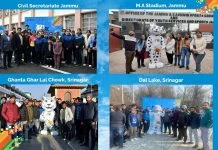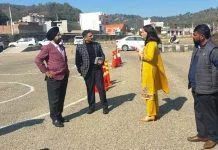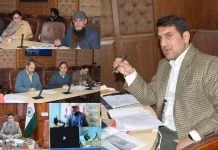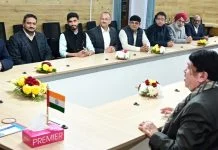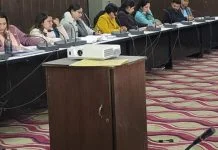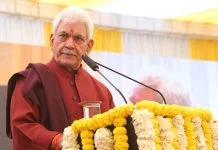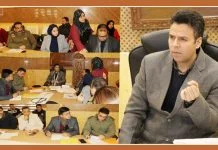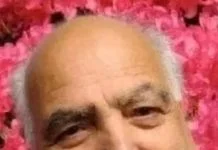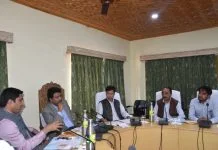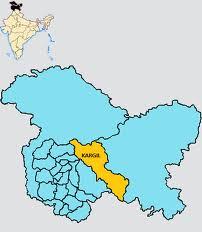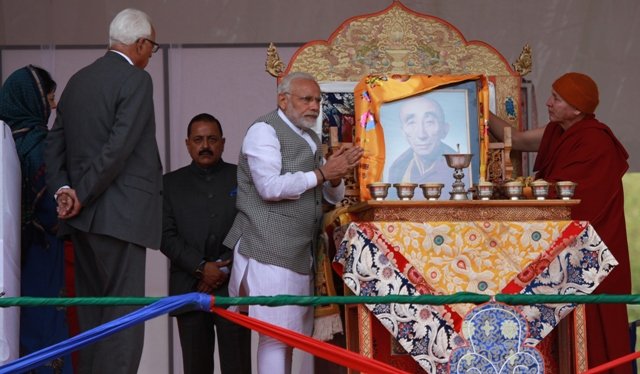Describing J&K as a shining example of plurality and inclusiveness, Chief Minister, Mufti Mohammad Sayeed, Monday credited the peace-loving people of the state for keeping their cool during the dark days of 1947 when passions ran high in the entire Subcontinent.
He said the people demonstrated the same maturity in the backdrop of certain recent unfortunate incidents by not falling prey despite extreme acts of provocation by certain fringe elements to disturb peace in the state. “We lost a precious life to the politics of hate but our Legislative Assembly rose to the occasion and conveyed a message of peace and brotherhood to the entire nation,” he said, while calling for strenuous efforts to isolate such elements threatening India’s rich diversity.
The Chief Minister said this while delivering Special Keynote Address during the India Ideas Conclave-2015, here this afternoon. He also answered a series of questions on Indo-Pak relations, good governance and reconciliation from the audience at the end of the session.
Citing the present PDP-BJP government in J&K as the best example of bringing people with different religious and ethnic backgrounds together, the Chief Minister said there was no comparable precedent of two avowed opposing ideological entities being mandated to forge a coherent and viable political combination in response to the electoral choice expressed by the people of the state. “I saw a historic opportunity to break a new path in resolving issues of chronic friction between regions and ethnic groups in the state by forging an alliance with BJP,” he said, asking those who preach politics of hate to take a leaf out of this rare combination of two ideologically different political parties.
The Chief Minister said India’s rich diversity and future as a leading world power cannot be held to ransom by a few fringe groups who thrust their ideologies on others by resorting to acts of violence. He said Prime Minister Narendra Modi’s slogan of transparency, good governance and development cannot take a back seat in the backdrop of a series of events that point towards rising intolerance in the country. “There are loose cannons in every party who try to vitiate the peaceful atmosphere. An overwhelming majority of people in the country want tranquillity and believe in mutual coexistence,” he opined.
Asserting that political contradictions can be best managed by living together in complete harmony, Mufti Sayeed said intolerance has no place in a country as diverse as India. “It is India’s all-inclusiveness that has made it the world’s most vibrant democracy today,” he asserted.
The Chief Minister praised the people of J&K for rejecting politics of hate despite extreme provocations after two persons were put on fire by an irate mob in Udhampur last month. “Our Assembly was in session at that time. By bringing in a resolution to convey message of peace to the entire nation, which was unanimously adopted by the members of the State Legislature, we have set an excellent precedent,” he said, while noting with sadness the passing away of Zahid Rasool Bhat, who later succumbed to his injuries in Delhi’s Safdarjung Hospital.
Mufti Sayeed said his coalition with BJP was strong and the two parties were committed to give people good governance and a transparent administration which is responsive to the needs of the people. He said sacrifices have been made on both sides without which it was not possible to honour the spirit of the mandate. “Some of my own party men were not convinced when we decided to forge an alliance (with BJP), but I went ahead,” he said, while referring to his decision to go with the party despite getting open invitation of support from Congress President, Sonia Gandhi and NC President Omar Abdullah to form the government.
Referring to the recent visit of Prime Minister to Srinagar, the Chief Minister said he was pleased to see the overwhelming response of the people to the rally. “There is a palpable change in J&K with transparency and good governance becoming the catchwords,” he said, while expressing a sense of satisfaction for the work done by his government in the first eight months of being in power.
On political reconciliation in the region, the Chief Minister said friendly relations between India and Pakistan were important as it always has a positive impact on J&K which enables us to deliver peace dividends to the people. He said he will continue to tread the path he travelled when he was first in charge of the state between 2002 and 2005. “The initiatives taken by former Prime Minister Atal Behari Vajpayee in his tenure gave peace for almost 10 years, which enabled us to take several confidence building measures like starting the cross-LoC travel in 2005,” he stated.
Crediting pre-independence leaders for feeling the pulse of the people, the Chief Minister said J&K chose a totally different path in 1947, keeping in mind its unique multicultural ethos.
Reflecting on the loss of trust in the period from 1952 to 1975 between New Delhi and Kashmir, the Chief Minister said if attempts to connect the three distinct regions of the state had been addressed at that time, the issues confronting the state today could have been tackled much better and much earlier. “The unpleasantness that cropped up in early 1950s, which resulted in colossal cleavage between regions, could have been avoided,” he said, adding the state cannot connect with India unless efforts are made in bringing the three distinct regions of Kashmir, Jammu and Ladakh together.
The Chief Minister stated that he always believed in resolving problems through dialogue in an atmosphere of mutual respect and trust and within the framework of humanity. He said J&K’s strong foundation has helped in frustrating attempts at undermining its basic fabric. “This positive trait has asserted itself at crucial moments of Kashmir’s history. Radical or sectarian ideology is anti-thesis of Kashmiri culture,” he added.
Later replying to a flurry of questions, Mufti Sayeed condemned the recent attacks in Paris which resulted in the death of several innocent persons. He said entire world should unite in isolating such persons who are perpetrating acts of terror.
On the issue of inconsistency in Indo-Pak relations that have direct bearing on J&K, the Chief Minister said embedding peace is an evolutionary process, which is bound to take time. “Building trust will not happen in a day, but I am hopeful that the two neighbours will resolve their differences by engaging in a meaningful dialogue,” he added.
The Chief Minister also described the annual Darbar Move as a unifying exercise that brings the people together when the capitals are shifted every six months.
The Conclave, which began yesterday, has attracted galaxy of prominent national and international personalities including Prime Minister of Bhutan, Lyonchhen Tshering Tobgay, former Prime Minister of Slovenia, Alojz Peterie, Chief Minister of Goa, Laxmikant Parsekar, Defence Minister, Manohar Parrikar, former Bangladesh Ambassador, Muhammad Zamir, Chairman, South Asian Institute for Strategic Affairs, Shakti Sinha, Professor, Contemporary Islamic Studies, Oxford University, Dr. Tariq Ramadan and Director, South Asia Studies Program, John Hopkins University, USA, Dr. Walter Andersen.

